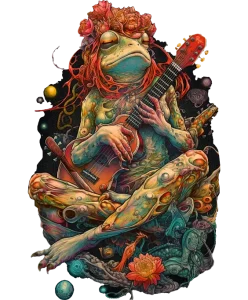Psychedelic-assisted therapy is becoming a popular way to treat mental health problems like depression, anxiety, and PTSD. In these therapy sessions, music plays an important role. It helps people relax, guides their emotions, and makes the experience more powerful.
In this article, we’ll look at why music is so important in psychedelic therapy and how it helps people get the most out of their sessions.
What Is Psychedelic Therapy?
Psychedelic-assisted therapy involves taking a psychedelic substance, like psilocybin (from magic mushrooms), LSD, or MDMA, while working with a therapist. The person takes the psychedelic in a safe environment, and the therapist helps them explore their thoughts and emotions. This type of therapy can help people process deep feelings, break old patterns, and gain new insights into their lives.
The psychedelic changes how the brain works, making it easier for people to think differently and feel more deeply. Music is used in these sessions to help guide the person through their experience.
How Does Music Help in Psychedelic Therapy?
Music plays a big role in psychedelic therapy because it affects how people feel and think. Here are some ways music helps during these sessions:
1. Guiding the Journey
When people take psychedelics, they often go through intense emotional experiences. Music acts as a guide, helping them move through these emotions. For example, calming music can help people relax, while uplifting music can bring out feelings of happiness and peace.
2. Enhancing Emotions
Psychedelics make people feel their emotions more strongly. Music can make these emotions even deeper. Whether a person feels sadness, joy, or something else, the right music helps them connect with these feelings on a more profound level.
3. Creating a Safe Space
One of the goals of psychedelic therapy is to make the person feel safe. Music can create a calm and soothing environment, making it easier for people to relax and let go of fear or anxiety. The right music helps the person feel supported during the session.
4. Helping with Letting Go
Psychedelic therapy is about letting go of control and being present in the moment. Music gives the person something to focus on, making it easier for them to surrender to the experience and let the journey unfold naturally.
What Kind of Music Is Used?
The type of music used in psychedelic therapy is chosen carefully to fit the mood of the session. Here are some common types of music used:
1. Ambient Music
Ambient music is soft, slow, and doesn’t have lyrics. It creates a peaceful atmosphere, helping people relax and feel calm.
2. Classical Music
Classical music is often used because of its emotional depth. The rich melodies and harmonies can guide people through their experience and help them connect with their emotions.
3. Nature Sounds
Sounds from nature, like rain, birds, or waves, are sometimes mixed into the music. These sounds can make people feel connected to the natural world, which can enhance feelings of peace and oneness.
4. World Music
Music from different cultures, like drumming or chanting, is also used in some sessions. This type of music can create a spiritual atmosphere and help people feel a deeper connection to the world around them.
Music After the Session: Integration
After the psychedelic session, the person enters a phase called integration. This is when they think about the emotions and insights they experienced and work with their therapist to understand what they learned. Music can also help during this phase.
Listening to the same music that was played during the session can help the person reconnect with their emotions and bring back memories of the experience. It can also help them process any feelings that come up after the session is over.
Why Does Music Work So Well in Psychedelic Therapy?
Music works so well in psychedelic therapy because it has a strong effect on the brain. Here’s why:
1. It Changes the Brain
Music and psychedelics both affect the brain in similar ways. They activate areas of the brain involved in emotions and memory. When combined, they help people feel their emotions more deeply and make it easier to process thoughts and memories.
2. It Supports Emotional Flow
Psychedelics break down barriers in the brain, allowing emotions and thoughts to flow freely. Music helps guide this flow, making the experience smoother and helping the person stay focused on their journey.
3. It Adds Meaning
Music has a way of making moments more meaningful. A certain song or melody can trigger deep emotions and memories. In psychedelic therapy, music can help the person make sense of their experience and find deeper meaning in what they felt.
What Do Studies Say About Music in Psychedelic Therapy?
Early research shows that music plays an important role in psychedelic therapy:
- Deeper Emotions: Studies show that music helps people feel their emotions more strongly during psychedelic therapy, which can lead to more powerful personal insights.
- Relaxation: Music helps create a calm, safe space that allows people to relax, making the therapy session less stressful and more enjoyable.
- Improved Healing: Music can support the healing process by helping people connect with their emotions, which leads to greater emotional release and transformation.
Conclusion: Music’s Role in Psychedelic Therapy
Music is a key part of psychedelic-assisted therapy. It helps guide the person through their journey, deepens their emotions, and creates a safe, supportive environment. Music makes the experience more meaningful and helps people connect with their inner world in a powerful way.
As psychedelic therapy continues to grow, music will remain an important tool for helping people heal and explore their thoughts and emotions.

